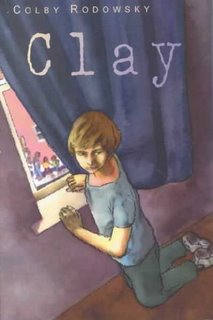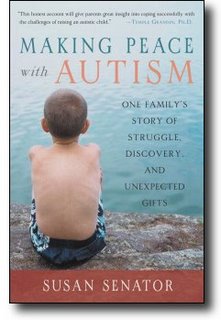Clay, by Colby Rodowski
This is a book about kids in crisis. Elsie and her younger brother, Tommy, are abducted by their non-custodial parent. Elsie is pulled in so many directions as she balances her love and loyalty to each of her parents, responsibility for her brother, the desire to be a normal kid, and the battle to find her own identity.
Without a doubt, this book is written for kids - the writing style and the predictability of the plot fall right in line with most fifth grade readers. But the subject matter, the realistic circumstances, and the raw emotion of the book are far from standard pre-teen fare, so much so that I could only recommend it to a ten year old if she's got the disposition and the opportunity to talk about the story with an appropriate adult. It just seems odd to me to find a book written for an audience too young to understand the inner turmoil churning inside the main character.
The younger brother in the book is autistic. As you might have guessed, that's what led me to the book in the first place. The book doesn't really address autism though, except as a plot device.
I ought to give this book high marks. After all, I cried at least three times while I was reading, and I'm definitely glad I read it. For reasons I can't quite put my finger on, I don't feel like I can rate the book better than three stars. I think it's because by the time you are old enough to grasp the full weight of Elsie's struggles you're too old for the predictable plot.
3 Stars





Without a doubt, this book is written for kids - the writing style and the predictability of the plot fall right in line with most fifth grade readers. But the subject matter, the realistic circumstances, and the raw emotion of the book are far from standard pre-teen fare, so much so that I could only recommend it to a ten year old if she's got the disposition and the opportunity to talk about the story with an appropriate adult. It just seems odd to me to find a book written for an audience too young to understand the inner turmoil churning inside the main character.
The younger brother in the book is autistic. As you might have guessed, that's what led me to the book in the first place. The book doesn't really address autism though, except as a plot device.
I ought to give this book high marks. After all, I cried at least three times while I was reading, and I'm definitely glad I read it. For reasons I can't quite put my finger on, I don't feel like I can rate the book better than three stars. I think it's because by the time you are old enough to grasp the full weight of Elsie's struggles you're too old for the predictable plot.
3 Stars






